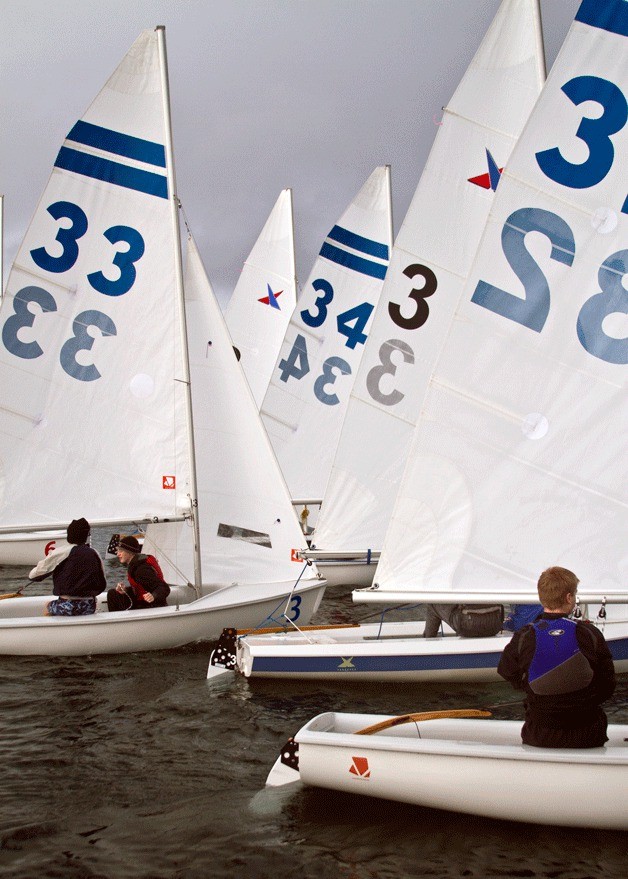The spring season for the Bainbridge High School sailing team will be a true test of teamwork as the student sailors, more than two dozen of varying skill and experience levels, shift their focus to the upcoming fleet and team racing events.
There are very few sports which more perfectly demonstrate the importance of teamwork than fleet sailing.
“The spring season emphasizes two-person, or double-handed, sailing,” said BHS Sailing Head Coach Susan Kaseler. “We sail two kinds of double-handed boats here on Bainbridge, FJs and V15s. 420s are also sailed in our Northwest District Interscholastic Sailing Association (NWISA) district, which includes several states.”
With practices beginning in earnest earlier this week, Kaseler said that the students are excited to get the boats in the water and prepare for Game Day, which in sailing actually goes by a different name.
“The season is full of regattas – competitions in sailboat racing – on the weekends, and we practice during the week after school,” she explained.
Call it what you will, but competition by any other name (be it big game or regatta) is just as sweet, for the winners at least.
“At the end of the season, we sail two qualifying regattas, one fleet racing and one team racing, to decide which school will represent the NWISA at the national championship for each discipline,” Kaseler said.
High-level team competition is nothing new for the Bainbridge student sailors, said Kaseler.
“BHS has been dominant in team racing for several seasons, progressing beyond the sailors who just go fast to be sailors who can really handle their boats well,” she said. “[They] understand the strategy and tactics of team racing. This season the team hopes to build the necessary skills to retain their district title.”
Two major sailing disciplines are tested during the spring season, Kaseler explained.
First, there is the more traditional discipline of fleet racing, in which the emphasis is on sailing your boat faster than any other boat around a course.
“Since this is a team sport, there are two divisions of boats, for the sake of simplicity referred to as A and B,” Kaseler said.
“The team fields the fastest sailors in each division, in several races, to earn a win in the regatta. All the schools sail at the same time, sharing an upwind, downwind, upwind course, with a gate at the leeward mark.”
The second discipline of the season is team racing, which Kaseler said is a different animal altogether, and quite a slippery subject.
“Not only must the team learn the skills to be the fastest, but also they must learn all kinds of boat-handling skills so that they can stop the boat, power it up, turn it without going forward, and execute all sorts of moves to trap and hold members of the opposing team,” she explained.
“With these maneuvers, the opponent may be manipulated into losing ground on teammates and losing the race. The course is shaped like a diagonal N with lots of marks for opportunities for lead changes. Three boats from each school are sailed against each other at a time in this discipline.”
Kaseler said that her coaching philosophy is to stress the importance of teamwork at all times, and to make sure that the students never lose sight of the fact that the sailing team is about racing the boats and not just cruising around.
“Our philosophy is that each kid should be coached in a manner to achieve his or her potential, that each kid is equally important, that there are no stars on the team, that the team is the star,” she said.
“There is no provision in spring season for sailing alone, and a team that is successful has to learn to work together to achieve a common goal. We stress being inclusive rather than exclusive, and we operate like a family of siblings, not that there aren’t contentious behaviors now and then, but [always] showing caring and respect toward our fellow teammates and the coaching staff.”
Having taken the team to national-level competition the past 11 years in a row, Kaseler said that there is additional pressure on herself and the other coaches.
That doesn’t change the way the team does business, however.
“The team seems to feel less pressure after all the success,” she said of the students.
“In fact, the team and the parents assume that we will qualify for a national championship. As a result, the coaches feel more pressure to qualify for the championship. But the coaching philosophy does not change, and we continue to coach to achieve our goal of building the deepest and strongest team we can.”

